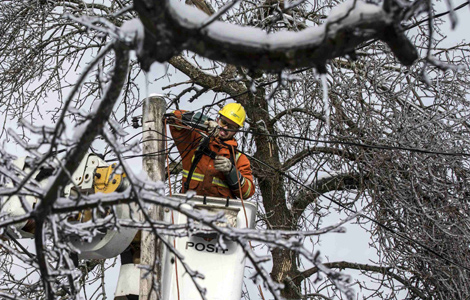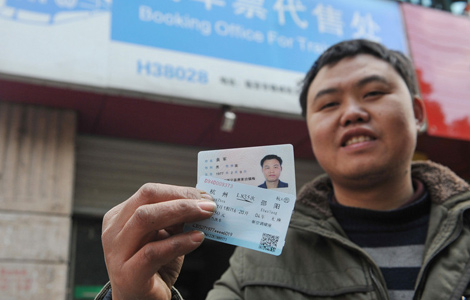Stray animals requires government, civil support
Updated: 2013-12-30 14:04
(Xinhua)
|
||||||||
Roles of NGOs
China currently has no law for stray animal protection, and non-governmental organizations play a huge role in caring for the poor animals.
Chongaiyoujia, where Li Qing works, is a Nanning-based NGO for stray cats and dogs established in 2009.
With social media tools like Sina Weibo and QQ, a popular instant messaging service in China, the rescue station searches for stray animals, takes them to hospitals for treatment and looks for people to adopt them. So far, the station has already helped more than 400 cats and dogs find homes.
Similar organizations are springing up in China and providing shelter for the stray animals. According to the Chinese Academy of Social Sciences, China is home to more than 10,000 such NGOs at the moment.
However, rescue stations are facing difficulties as the number of strays is constantly on the rise. Tight budgets and limited land for facilities are pressuring the NGOs to find a solution. Furthermore, without professional teams for animal inspection and quarantine in the stations, diseases can be transmitted.
Another challenge for the NGOs is the lack of legal status. This is the case for Pohome, a Beijing-based stray rescue station that has about 500 volunteers.
Vivien, one of the station's organizers, said that although China is easing the registration polices for social groups, organizations for animal welfare are still easily shut out during the complicated registration process.
"If we are not legally recognized, we will constantly encounter difficulties during our operation," she said.
In addition, many people seem to show little compassion for the strays, and often ridicule volunteers for "showing too much love for animals rather than for street children and school dropouts," Li Qing said, adding that the human indifference and a lack of animal protection laws have contributed to the worsening situation of strays in China.
Shi Ying, a professor with the Shaanxi Academy of Social Sciences, said that the government should offer support for stray animal NGOs to help ease the trouble that these organizations are experiencing.
"For instance, the government could designate certain areas in suburbs or parks for stray animals, where people could donate food and money," Shi said.
Shi suggested that China learn from foreign countries that have done a good job in handling strays.
Canada and the United States are home to 7,000 NGOs for strays, which receive government funding as well as donations from the general public, and in Britain, animals are efficiently protected by an animal law passed in 1911 and other laws, according to Shi.
Vivien said that protection of strays needs better press, with the media working to help spread the word among the public.
She said that if people would quit buying pets on impulse, stop overbreeding and abandoning animals, the number of stray animals would decrease.
"In this way, fewer stray animals would die of malnutrition and diseases, be accidently crushed by wheels or brutally skinned by people," she said.

 Second blast kills 10 in Russian city
Second blast kills 10 in Russian city
 F1 legend Schumacher in coma after ski accident
F1 legend Schumacher in coma after ski accident
 Net result
Net result
 Fire on express train in India kills at least 26
Fire on express train in India kills at least 26
 Times Square visitors purge bad memories
Times Square visitors purge bad memories
 Ice storm leaves many without power in US, Canada
Ice storm leaves many without power in US, Canada
 'Chunyun' train tickets up for sale
'Chunyun' train tickets up for sale
 Abe's war shrine visit sparks protest
Abe's war shrine visit sparks protest
Most Viewed
Editor's Picks

|

|

|

|

|

|
Today's Top News
Outrage still festers over Abe shrine visit
Suicide bomber kills 16 at Russian train station
Magazine reveals NSA hacking tactics
Pentagon chief concerned over Egypt
Broader auto future for China, US
Li says economy stable in 2014
Bigger role considered in the Arctic
3rd high-level official probed
US Weekly

|

|








